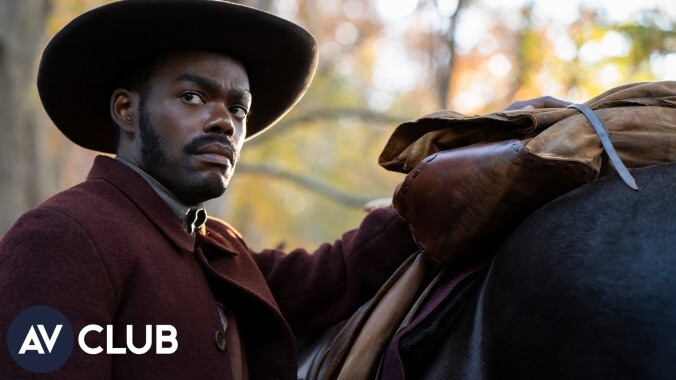The Underground Railroad's William Jackson Harper on the enduring pain of slavery
As Royal, a free activist living in Indiana, William Jackson Harper serves as a ray of optimism in Amazon Prime Video’s new series The Underground Railroad, set during a mythical 1800s. Royal is living, working, and getting rich on a farm owned by free Black people, and he’s convinced that good will win out eventually, the hard work of Black people will finally be recognized, slavery will end, and he and Thuso Mbedu’s Cora can live together forever. The A.V. Club talked with Harper about the pain The Underground Railroad both elicits and contains and why he thinks it’s artistically essential. He also discussed why he thinks there’s no national memorial for those held in slavery and the enduring myth of America’s bootstrapping origin story.
The A.V. Club: Your show is hard to watch at points, in terms of the pain it elicits and the pain it contains. Why do you think that making space for that pain is both important and artistically essential?
William Jackson Harper: I think that we’re living in a time where we’re starting to unpack certain things, and it is my hope that through seeing something like this particular piece, which is about resistance in spite of that pain and that trauma and that brutality, that people will watch it and perhaps feel indicted. What are the ways in which they allow for certain injustices to continue, even if they’re opposed to them? What are the ways in which we are just indifferent to certain things?
I say this as a person who definitely has opinions on a lot of things, and I decided to do nothing in certain respects. So it’s my hope that through seeing something like this, in the way that it throws all of this intensity right into your living room and into your lap, that it forces some really uncomfortable conversations that I think need to be had.
AVC: It’s important, I think, that your character, Royal, lives mostly in Indiana, which most people would consider to be a northern state, though these are parts that lie right on the border with Kentucky. I think white people in 2021 occasionally have a tendency to go, “Oh, slavery was a Southern thing. My family wasn’t involved.” But injustice isn’t just about the South. You see that in the show, and you see that in how, for instance, a lot of the awful police brutality we’ve seen recently has been in places like Cleveland or Minneapolis. Injustice and racism and the remnants of slavery aren’t—and weren’t— problems that are limited to a certain area.
WJH: It’s everywhere. I feel like there’s a way in which people can let themselves off the hook by virtue of being born in a state that is north of the Mason-Dixon line that’s like, “Well, that’s not me at all.” But there were some violent protests in Boston about bussing. There are a lot of really messed up things that happened in Chicago. As a matter of fact, the last time I was in Chicago, I was doing a play there and someone actually called me the N-word on the street. I was walking back to the hotel that I was staying in with my friends. My mom was there with me. And, [this person] called us a bunch of N-words. You don’t escape that because of where you live. That’s everywhere, and I think it’s important to go ahead and put that out there.
AVC: I am so sorry that happened. That’s awful. One thing that The Underground Railroad left me questioning is—and this is something that Toni Morrison talked about for 30 some years—but why do you think there’s no national monument for the millions of people who were held in slavery? There’s the National Museum Of African American History And Culture in D.C., but that just happened within the past few years. There’s no Vietnam Memorial equivalent for the millions of people that were held in slavery.
WJH: I really don’t have an answer for that. I do wonder, though, if that would really counter the narrative that America has for itself. To really own that brutality and that kind of injustice, it really tarnishes America’s self-image, and I think that a lot of people want to have that.
Everyone now wants to think that they would have been an abolitionist, and that’s just not the way it would have been. I feel like at its core, it’s really more about like, “Let’s sweep that one under the rug, because that’s not who we are now, and it was really awful.” If we actually owned that part of ourselves, then that makes us bad. I think that if you want to be the hero of your own story, that’s one of those things that you probably just can’t have in your own narrative. So I wonder if that’s part of it. That’s my way of thinking about it.
It’s also one of those things where there’s a lot of people whose names and cultures were completely stripped from them. How would we even know? I can only go so far back in my own lineage because everything else was wiped out. So, yeah, there could be a monument with names, but so many of them were lost and destroyed. I guess that’s more of a logistical thing, but that was on purpose because people were not viewed as people. I think it should happen in some way or another.
